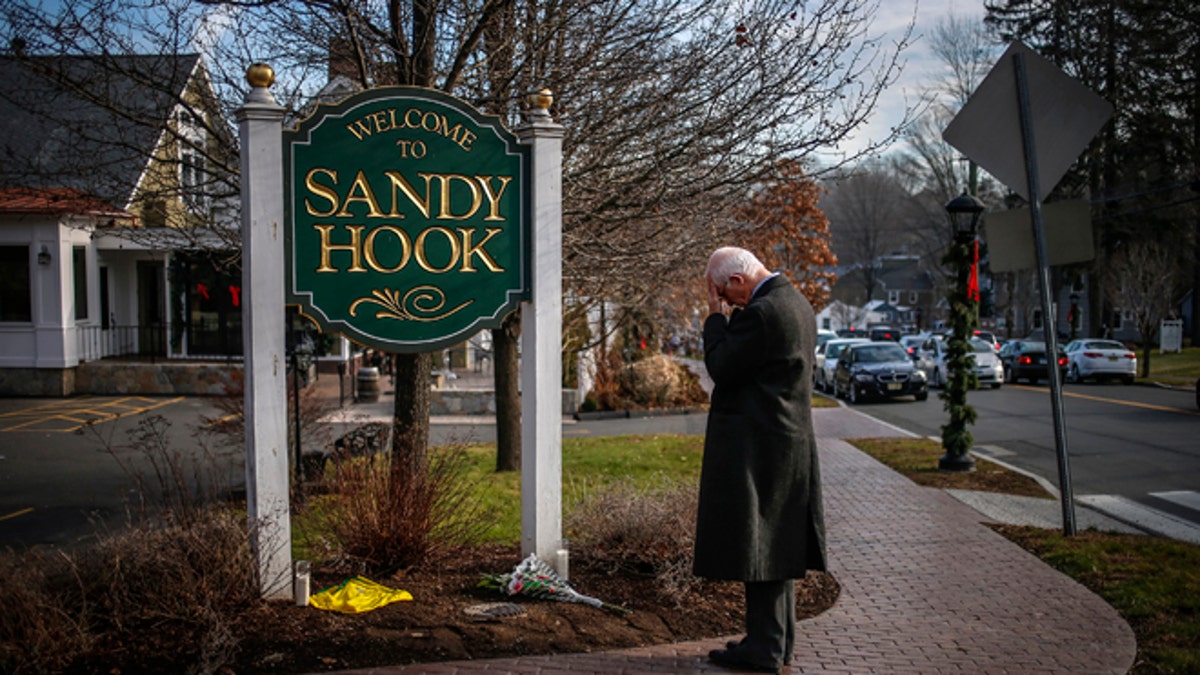
FILE: December 15, 2012: A visitor supports residents grieves for victims of an elementary school mass shooting, at the entrance to Sandy Hook village, in Newtown, Conn. (REUTERS)
Though Congress has done little to increase spending or enact laws to improve mental-health care after the 2012 Sandy Hook school shootings, dozens of states have increased or restored such funding.
States struggling to make ends meet during the recent recession cut more than $4 billion from their mental-health budgets from 2009 through 2012.
Now with the one-year anniversary of the Dec. 14, 2012, Sandy Hook elementary school shootings just days away, a new report shows at least 37 states have increased spending on mental health programs.
Texas lawmakers appear to have approved the biggest increase -- $259 million more in their newest two-year budget, the largest such increase in state history, according the National Alliance on Mental Health.
“With few exceptions, state legislatures acknowledged the need [to] increase or maintain mental-health appropriations or enact legislation,” the group said in its 2013 State Legislation Report.
Many of the increases are related to efforts to comply with mental-health provisions in ObamaCare that start next year. And much of the legislation enacted this year was to expand the state-federal Medicaid program under the law because it is essential in paying and providing coverage for the estimated 2.7 million uninsured Americans affected by mental illness, the report states.
Oregon, for example, increased its 2014-15 budget by roughly 22 percent to comply with the president’s signature health care law.
The group argues that timing also played a factor in the increases, particularly the White House’s response to the Sandy Hook shootings -- in which 20 students and six adults were fatally shot. And that the mass shooting happened right before state legislative sessions started.
The White House called for widespread changes including tighter school security and increased background checks on gun buyers. However, the NAMI argued the vast majority of people with mental illness is “no more violent than the general population” and called for providers of mental-health care to do a better job of complying with exist standards when reporting dangerous behavior related to gun ownership.
The report points out that mental-health advocates warned that the “avalanche” of state legislation could result in Americans not seeking mental-health care and that changes could threaten civil liberties.
Among the changes cited was the New York Secure Ammunition and Firearms Enforcement Act, one of the first bills enacted in 2013 that increased the responsibilities of providers to turn over mental health records as related to gun sales. Similar SAFE acts were enacted in Arkansas, Colorado, Connecticut and Tennessee.
The report also points out Alaska and North Carolina reduced their mental health budgets.
The Obama administration last month announced the final executive order of 23 that the president signed in January, while Congress has not come through in efforts to keep guns out the hands of people who are mentally ill and dangerous.
One change is mental health patients can now get immediate emergency room care, like somebody with a broken bone, without having to get pre-approval from their insurance company.
"Imagine what it would mean if people felt as comfortable saying they were going for counseling as they do saying they're going for a flu shot or physical therapy," Health and Human Services Secretary Kathleen Sebelius said in announcing the change.
Vermont Democrat Sen. Patrick Leahy, chairman of the Senate Judiciary Committee, said before the president signed the executive orders that he didn’t know whether an assault weapons ban could pass the Senate but thought a bill to improved background checks and related ones could pass.
"There are some who say nothing will pass,” he said. “I disagree with that. What I'm interested in is what we can get."




